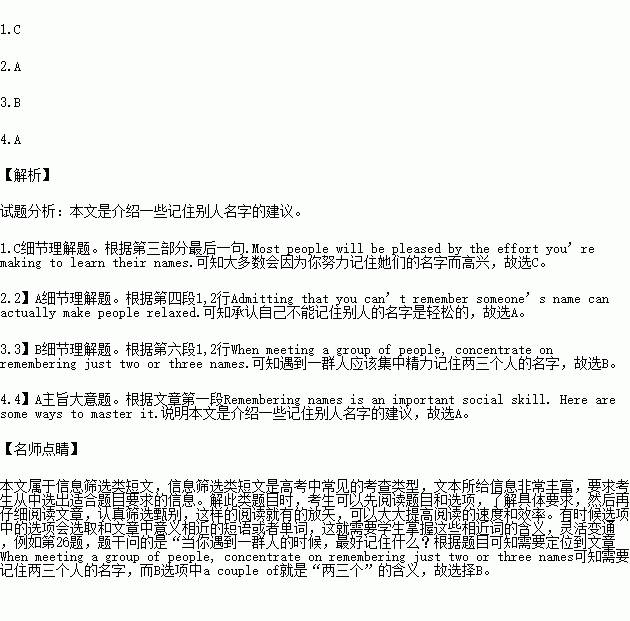题目内容
Remembering names is an important social skill. Here are some ways to master it.
Recite and repeat in conversation.
When you hear a person’s name,repeat it. Immediately say it to yourself several times without moving your lips. You could also repeat the name in a way that does not sound forced or artificial(虚假的).
Ask the other person to recite and repeat.
You can let other people help you remember their names. After you’ve been introduced to someone,ask that person to spell the name and pronounce it correctly for you. Most people will be pleased by the effort you’re making to learn their names.
Admit you don’t know.
Admitting that you can’t remember someone’s name can actually make people relaxed. Most of them will feel sympathy (同情) if you say, “I’m working to remember names better. Yours is right on the tip of my tongue. What is it again?”
Use association (联系).
Connect each person you meet with one thing you find interesting or unusual. For example,you could make a mental note: “Vicki Cheng -- tall, black hair.” To strengthen your associations, write them on a small card as soon as possible.
Limit the number of new names you learn at one time.
When meeting a group of people, concentrate on remembering just two or three names. Free yourself from remembering every one. Few of the people in mass introductions expect you to remember their names. Another way is to limit yourself to learning just first names. Last names can come later.
Go early.
Consider going early to meetings, parties and classes. Sometimes just a few people show up on time. That’s fewer names for you to remember. And as more people arrive, you can hear them being introduced to others — a review for you.
1. How will most people feel when you try hard to remember their names?
A. They will be moved. B. They will be annoyed.
C. They will be delighted. D. They will be discouraged.
2.If you can’t remember someone’s name, you may ______.
A. tell him the truth
B. tell him a white lie
C. ask him for pity
D. ask others to help you
3.When you meet a group of people, it is better to remember ______.
A. all their names B. a couple of names first
C. just their last names D. as many names as possible
4.What does the text mainly tell us?
A. Tips on an important social skill.
B. Importance of attending parties.
C. How to make use of associations.
D. How to recite and repeat names.
 名校课堂系列答案
名校课堂系列答案There are some strange driving laws in different countries.
Countries | Laws |
Vietnam | If you’re in Vietnam without a Vietnamese driver’s license, you risk a prison sentence of up to three years. |
Russia | In Moscow, if your car is dirty enough to draw dust art, you will be fined about 2,000 rubles (about US 55 dollars). Worse yet, it’s illegal to wash your car by hand in public places – forcing you to take it to one of the few car wash facilities. |
Thailand | Drivers – male or female – can’t drive shirtless whether it’s a car, bus, or a tuk-tuk cab. |
France | France requires its drivers to carry a portable breathalyzer(便携式酒精测量仪) at all times when driving a car. The one-time breathalyzer cost around US 5 dollars, and if you don’t have one, you will be fined US 15 dollars. |
Cyprus | Raising your hands in the car can get you fined of US 35 dollars. The law states a driver can be fined if the person “is in an irregular position inside the car or raises his hand from the steering wheel unnecessarily.” |
Japan | Politeness isn’t just the culture in Japan; it is part of driving laws. Splashing(飞溅) a person by driving through a puddle(水坑) with your car will cost you over US 60 dollars. The country is also strict with its DUI (酒驾) laws – riding with or lending your car to a driver who gets caught drinking and driving can lead to a fine costing thousands of dollars. |
1.Where should you go to wash your car when you are in Moscow?
A. The car wash facilities. B. Any public place.
C. Your home. D. The forest.
2.What can you get fined for in Cyprus?
A. Forgetting to carry a portable breathalyzer.
B. Not having a Cyprus driver’s license.
C. Putting your hands above your head.
D. Driving without a shirt.
3. If you are fined thousands of dollars in Japan, you may have been ________________.
A. in an irregular position in your car
B. sitting in a car with a drunk driver
C. splashing a person with mud
D. impolite to other drivers
4.This passage can most likely be found in __________.
A. a law document
B. a fashion magazine
C. an international newspaper
D. a book on interesting cultures

